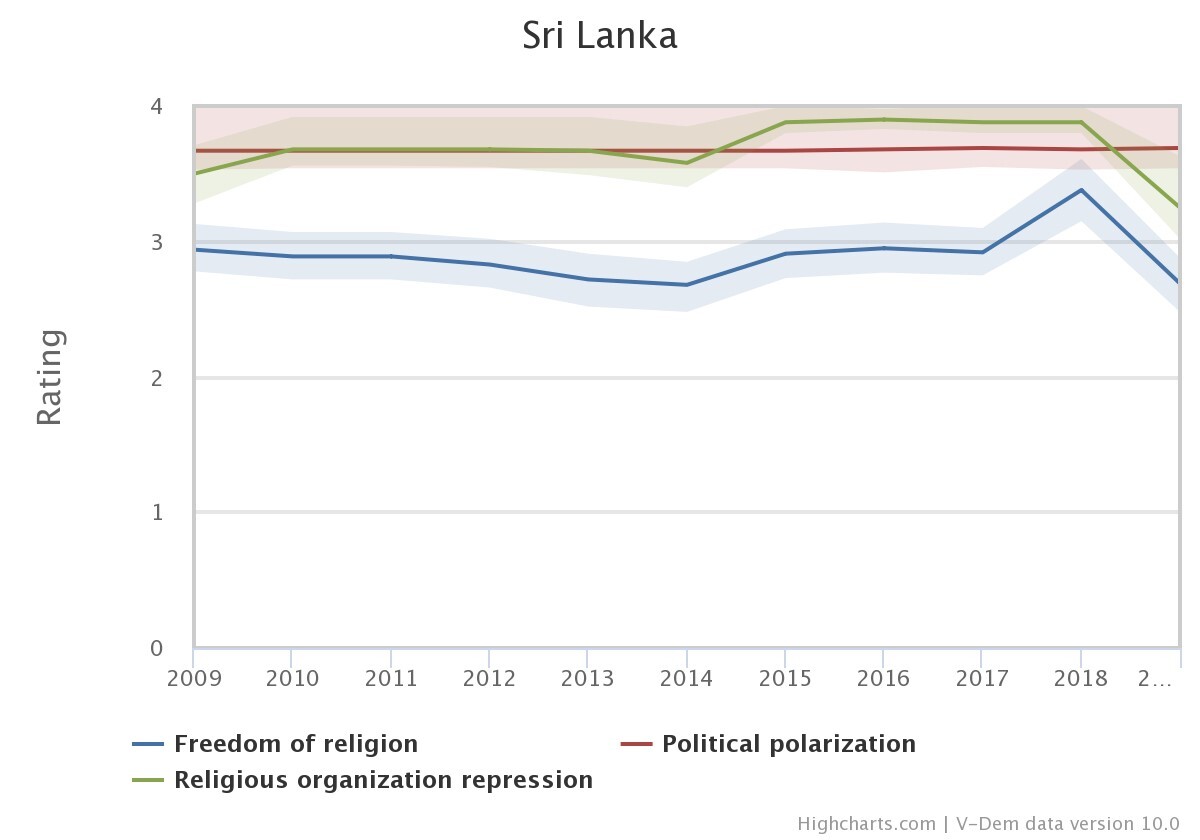Covid-19 Continues Increased Repression of Religious Minorities in Sri Lanka
By: Rowan Cole
Mar 17, 2021
After Sri Lanka celebrated its Independence Day last month, the country remains intensely polarized following a 26 year civil war from 1983 to 2009 between the Sinhala majority and Tamil minority groups. However, since 2018, the Muslim minority population has been subject to increasing discrimination from the government, and government indifference to its abuse.
V-Dem data reflects these trends, showing a less favourable environment for religious minorities since 2018. Since 2009, political polarization values are consistently high, indicating that Sri Lankan society is noticeably divided into antagonistic political groups with hostile interactions between groups far more likely than friendly ones. Such political groups are likely to be formed along ethnic or religious lines. The UN Special Rapporteur on freedom of religion or belief found in a 2019 visit to Sri Lanka that citizens often identify themselves as Sinhala, Tamil or Muslim – the former two closely equated to Buddhism and Hinduism respectively, creating an environment of divisive identity politics.
This polarization has been inflamed by the 2019 election of President Gotabaya Rajapaksa on a platform of religious nationalism, with declarations that the Sinhala ethnic group and religion might be under threat of destruction. Religious nationalism has targeted Muslim communities, with a major outbreak of Islamophobic violence in March 2018,allegedly in response to the killing of a Sinhalese man by a group of Muslims. Despite the Sri Lankan government’s imposition of a state of emergency, there are allegations of law enforcement indifference to the abuse of minority groups.
The Freedom of Religion indicator shows a sharp downturn in 2018. Religious freedoms remain somewhat respected by public authorities, but some religious groups are subject to restrictions or discrimination. Religious organization repression is coded in the opposite way with higher values indicating lower levels of repression. Therefore, 2015 through to 2018 shows there were almost no restrictions on religious civil society organizations’ activities, but the decreasing value from 2018 is indicative of the introduction of some material sanctions to deter religious organizations’ activities.
Despite the Sri Lankan constitution ostensibly protecting freedom of religion or belief and its manifestation under Articles 10 and 14, the government used Emergency Laws, in place after the 2019 Easter Sunday jihadist bombings that killed 350 people, to target Muslim civilians by banning face coverings. Therefore, women wearing religious face coverings were confined to their homes (until the government lifted the ban on August 23, 2019) or obliged to remove religious garments.
COVID-19 has also inspired discriminatory legislation. Human Rights Watch describes a scientifically baseless government requirement of cremation of any victim of COVID-19 as discriminatory against the Muslim community. This violation of Islamic burial traditions is a continuation of Coronavirus marginalisation of Muslims by the government, first characterised by indifference to false rumours, disseminated by Rajapaksa allies, that Muslims are deliberately spreading Coronavirus.


